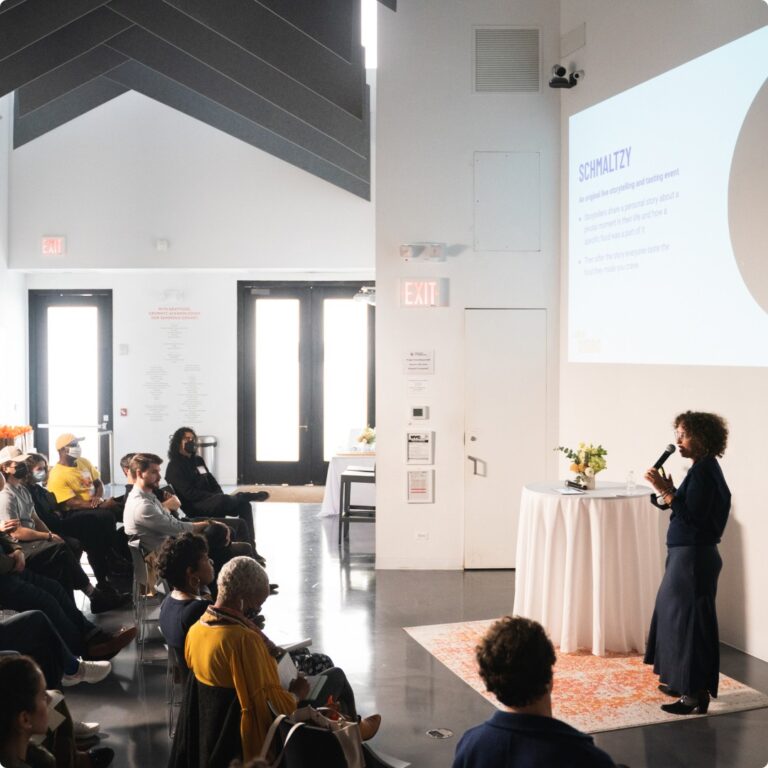As event creators, we’re always learning and improving. Whether you’ve been doing it forever or you’re just starting out, sharing the knowledge and bouncing ideas off each other can only make your events stronger and create a sense of community with your fellow event experts.
For the latest in our RECONVENE Sessions series, Thinking Ahead: Designing for Event Success, we brought together event experts Steven Angel and Kerryn Howell for a fireside chat, discussing everything from budgets and planning to finding the best suppliers and hosting hybrid events.
Steven Angel – Event producer and host of Back to the Future of Events podcast
Angel has worked on over 500 events, including special events for some of Australia’s largest companies and major sporting events. He also hosts the “Back to the Future of Events” podcast, which explores the forefront of the “new normal” of the Australian events industry.
Kerryn Howell – Creative Director at JAK Creative & Events
A qualified Visual Merchandiser with over 25 years’ experience, Howell is recognised as one of Australia’s foremost event designers and has led her business in delivering successful and unique corporate events, activations, product launches and social events.
Watch the full event recording below and for additional tips from Eventbrite’s RECONVENE events series, visit our recaps hub.
8 top tips from the experts
1. Understand why you’re hosting an event
Before you get to the planning stage, Steven recommends really trying to understand the core meaning behind your event. This will help inform your planning with much more detail.
“There are really three main reasons people do an event,” Steven says. “They’re going to communicate something, like a brand message, a product launch…it’s a marketing exercise. The other form would be a celebration – celebrating with gala awards or end-of-year functions or recognising people for their efforts. The final one is educating. It’s like this, it’s a workshop or a conference. Once you understand that, then you can understand what you’re looking for.”
2. The importance of planning
“For me, two really important questions are: what does a successful event look like to you, and how will you know that this event has been successful?” asks Kerryn. “If you can get those two pieces of information, then you’ve got a really good place to start creating from.”
Success looks different to everyone, but ticket sales, attendee satisfaction and positive supplier relationships are some common markers.
3. Setting a budget
As Steven says, it doesn’t matter if your budget is $1000 or $1 million – you need to set it and stick with it.
“Understand what your hard costs are, the non-negotiables in your budget – what can’t change, what you need to have,” Steven says. “Understand what your break-even is. If you’re selling tickets you need to know what that is. And you need to do a lot of research so you know what the real costs are.”
4. Finding the best suppliers
The first step to finding great suppliers is to get out to events and see who’s doing it well. Once the picture is clearer, look for those suppliers who will be on the same page as you.
“Find people who share the same values,” says Kerryn. “Being completely committed to the client having the best experience ever becomes clear very quickly in an event space. Who’s on that same boat as you? Who’s going to do whatever it takes to get it over the line? Who’s not going to whinge about it? Who’s going to roll up their sleeves, put a smile on their face and do it?”
5. Reconciling event creator and attendee host and guest expectations
If, like Steven and Kerryn, you create events on behalf of a client, you might find that the client’s expectation isn’t always aligned with the attendee. While it’s always important to satisfy the client, it shouldn’t mean discounting your own insight and expertise into what makes for a great attendee experience. Kerryn says that whether or not the client agrees, you should share your opinion.
“Actually [the client] is paying me for my opinion, and I think it’s really important to show them my understanding of the situation because the client can say, ‘well why didn’t you say so?’ And you never want to be in that situation.”
6. How to host hybrid events
Even with the easing of Covid restrictions, hybrid events (hosted both in-person and remotely, at the same time) are continuing. It’s tough to strike the balance, but the key is not sacrificing one experience for the other.
“Bringing the two together needs to be seamless, but also not interrupting the live event so much because you’re trying to cater for the virtual as well,” says Steven. “If it has to be hybrid, what’s important for those who are online? What do they need to see? And are there things that we can do for them that are’s exclusive to virtual? Because you may end up having entertainment elements that don’t interfere with the live element.”
7. Dealing with cancellations
Cancellations – particularly those that are health-related – are an unfortunate fact of life these days. While you can’t ensure that people will always attend your event, Kerryn says that understanding things like payment deadlines and refund terms can make things less stressful. In the event that an event is cancelled, it pays to be certain of your ability to recoup deposits, avoid payment obligations or seek refunds.
8. Making use of new technology
If there’s one positive outcome from restrictions, it’s the broad adoption of new technology. Steven recommends using some digital platforms that can help with factors like delegation and supplier collaboration to make event planning a little more seamless.
“Because of Covid we’re working on shared productivity platforms like Monday.com, things like that,” says Steve. “It’s much easier to collaborate with so many different suppliers, you can bring them all in. We weren’t really doing that before.”
Final thoughts
When creating events, we can often get caught up in the rush and excitement. Taking a moment to reflect, as we did with Steven and Kerryn, can be extremely valuable. Whatever your specialty or passion, it’s always worth taking the time to dig a little deeper into what makes your events unique, and the opportunities to keep growing. The power of RECONVENE is in sharing our event experiences with each other. As event creators, remember to take the time for self-reflection and think deeper about the simple steps you can take to keep moving forward.
Ready to get started with your next event? Let’s go!





